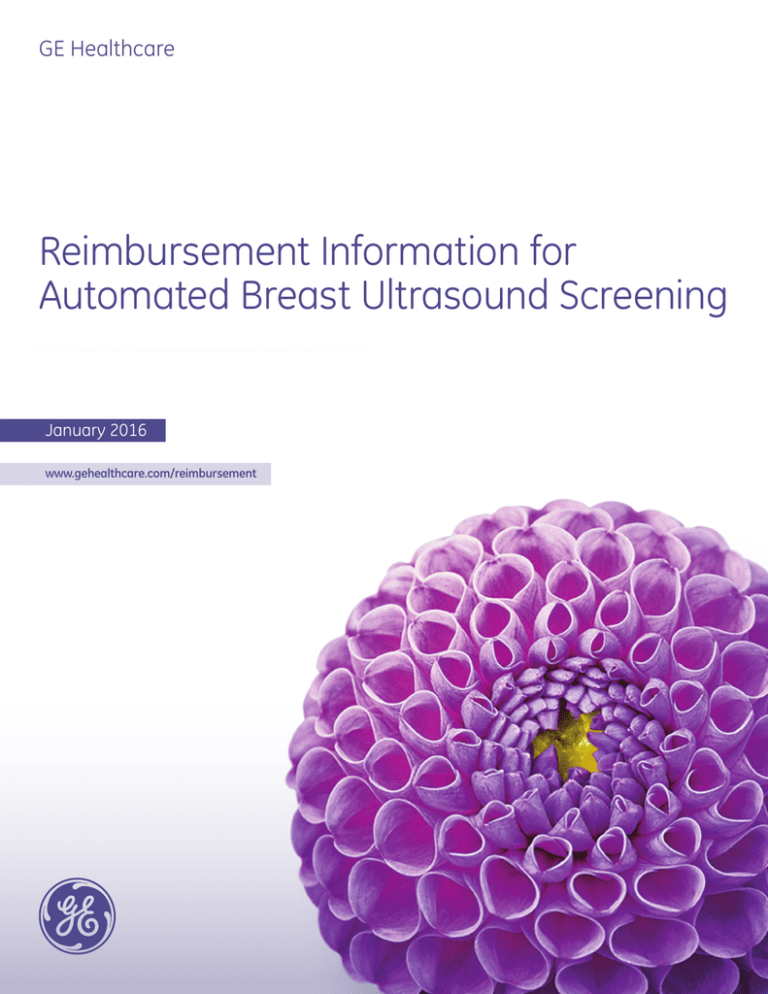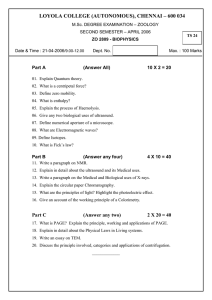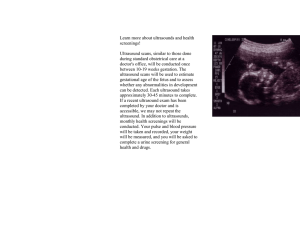
GE Healthcare
Reimbursement Information for
Automated Breast Ultrasound Screening
January 2016
www.gehealthcare.com/reimbursement
The Invenia™ ABUS is indicated as an adjunct to mammography for breast cancer screening in asymptomatic
women for whom screening mammography findings are normal or benign (BI-RADS® Assessment Category
1 or 2), with dense breast parenchyma (BI-RADS Composition/Density C or D), and have not had previous
clinical breast intervention. The device is intended to increase breast cancer detection in the described
patient population. The Invenia ABUS may also be used for diagnostic ultrasound imaging of the breast in
symptomatic women.
Coding and Payment Information
The following provides 2016 national Medicare Physician Fee Schedule (MPFS) and the Hospital Outpatient Ambulatory Payment
Category (APC) payment rates for the CPT1 codes identified in this guide. Payment rates reflect DRA-imposed payment reductions
for services that are subject to the regulations. Payment will vary in geographic locality.
2016 Medicare reimbursement for procedures related to breast ultrasound (Reflects national rates, unadjusted for locality)
HCPCS Code/Description
Medicare
Hospital Outpatient Payment2
Medicare Freestanding Facility/
Physician Office Payment3
CPT 76641*
Ultrasound, breast, unilateral, real time with image
documentation, including axilla when performed;
complete
APC 5531
Technical***
$71.66
Professional****
$37.27
Global
$108.92
*
Four-quadrant and retroareolar region imaging required for “complete” examination. Axilla imaging may or may not be performed.
** The STVX-packaged codes (status indicator Q1) are packaged when billed on the same date of service with any other code with a status indicator of S, T, V, or X. If not, they are separately payable under a separate APC. If you report more than one STVX- or T-packaged code without a separately payable service into which it would otherwise be packaged, CMS makes separate payment only for the highest-paying service and packages all others into that code. Reference information
may be found at the online resource: https://www.cms.gov/
Regulations-and-Guidance/Guidance/Manuals/downloads/ clm104c04.pdf
Modifiers
Modifiers explain that a procedure or service was changed
without changing the definition of the CPT code set. Here are
some common modifiers related to the use of ultrasound for
breast procedures.
26 – Professional Component
A physician who performs the interpretation of an ultrasound
exam in the hospital outpatient setting may submit a charge
for the professional component of the ultrasound service using
a modifier (-26) appended to the ultrasound code.
Status
Indicator = Q1**
$
92.07
***
Technical (-TC) – The technical component is the equipment
and technician performing the test. This is identified by adding
modifier “TC” to the procedure code identified for the technical
component charge.
****
Professional (-26) – The professional component is the interpretation of the results of the test. When the professional component is reported separately, the service may be identified by adding
modifier “26.”
Payment rates for Medicaid as well as Private (non-Medicare) payers
will vary by insurer as well as individual contractual agreements. It is
always recommended to check with your payer for coding, coverage
and reimbursement requirements.
50 – Bilateral Procedure
This modifier would be used to bill bilateral procedures that
are performed at the same operative session, unless otherwise
identified in the listings. To appropriately adjust payment when
bilateral procedures are furnished under the PFS, payments
are adjusted to 150 percent of the unilateral payment when
a service has a bilateral payment indicator assigned.
TC – Technical Component
This modifier would be used to bill for services by the owner of
the equipment only to report the technical component of the
service. This modifier is most commonly used if the service is
performed in an Independent Diagnostic Testing Facility (IDTF).
ICD-10-CM and ICD-10-PCS
ICD-10-CM (diagnosis) and ICD-10-PCS (procedure) codes
were implemented October 1, 2015. It is the physician’s
ultimate responsibility to select the codes that
appropriately represent the service performed, and to
report the ICD-10-CM code based on his or her findings or
the pre-service signs, symptoms or conditions that reflect
the reason for doing the mammography. Examples are
provided of ICD-10-CM diagnosis and ICD-10-PCS
procedure codes that relate to breast ultrasound
procedures for breast cancer screening.
ICD-10-CM (diagnosis)
• R92.0 Mammographic microcalcification found on diagnostic
imaging of breast
• R92.1 Mammographic calcification found on diagnostic imaging
of breast
• R92.2 Inconclusive mammogram
• R92.8 Other abnormal and inconclusive findings on diagnostic
imaging of breast
• Z12.39 Encounter for other screening for malignant neoplasm
of breast
ICD-10-PCS
• BH40ZZZ Ultrasonography of Right Breast
• BH41ZZZ Ultrasonography of Left Breast
• BH42ZZZ Ultrasonography of Bilateral Breasts
For more information on ICD-10-CM/PCS, please go to
https://www.cms.gov/medicare/Coding/ICD10/index.html
Documentation Requirements4
Ultrasound performed using either a compact portable
ultrasound or a console ultrasound system are reported
using the same CPT codes as long as the studies that were
performed meet all the following requirements:
• Medical necessity as determined by the payer
•Completeness
• Documented in the patient’s medical record
A separate written record of the diagnostic ultrasound
or ultrasound-guided procedure must be completed and
maintained in the patient record. This should include a
description of the structures or organs examined the findings
and reason for the ultrasound procedure. Diagnostic
ultrasound procedures require the production and retention
of image documentation. It is recommended that permanent
ultrasound images, either electronic or hardcopy, from all
ultrasound services be retained in the patient record or
other appropriate archive.
Note: The description of the new code 76641 states that axilla
imaging is not required, but included in the code description if
performed. Therefore, if this is part of the examination, it should
be documented in the patient files that it was performed.
Payment Methodologies for
Ultrasound Services
Medicare may reimburse for ultrasound services when the
services are within the scope of the provider’s license and are
deemed medically necessary. The following describes the various
payment methods by site of service.
Site of Service
Physician Office Setting
In the office setting, a physician who owns the ultrasound
equipment and performs the service, or a sonographer who
performs the service, may report the global code without
a –26 modifier.
Hospital Outpatient
When the ultrasound is performed in the hospital outpatient,
physicians may not submit a global charge to Medicare
because the global charge includes both the professional
and technical components of the service.
If the procedure is performed in the hospital outpatient setting,
the hospital may bill for the technical component of the
ultrasound service as an outpatient service.
The CPT code filed by the hospital will be assigned to a hospital
outpatient system Ambulatory Payment Classification (APC)
payment system, and payment will be based on the APC
grouping. However, for Medicare, the hospital outpatient
facility and the physician must report the same CPT code.
If the physician is a hospital employee, the hospital may
submit a charge for the global service.
Hospital Inpatient Setting
Although this service would not typically be performed in the
inpatient hospital setting, if it is performed in this setting, charges
for the ultrasound services occurring in the hospital inpatient
setting would be considered part of the charges submitted
for the inpatient stay and payment would be made under the
Medicare MS-DRG payment system. However, the physician may
still submit a bill for his/her professional services regardless.
Note: Medicare may reimburse for ultrasound services when
the services are within the scope of the provider’s license and
are deemed medically necessary.
Coverage information
Procedures may be a covered benefit if such usage meets all
requirements established by the particular payer. However,
it is advisable that you verify coverage policies with your
local Medicare Administrative Contractor. Also, it is essential
that each claim be coded appropriately and supported with
adequate documentation in the medical record.
Coverage by private payers varies by payer and by plan with
respect to which medical specialties may perform ultrasound
services. Some private payer plans will reimburse for ultrasound
procedures performed by any physician specialist while other
plans will limit ultrasound procedures to specific types of
medical specialties. In addition, plans may require providers
to submit applications requesting these diagnostic ultrasound
and ultrasound-guided services be added to the list of services
performed in their practice. It is important that you contact the
payer prior to submitting claims to determine their requirements.
Disclaimer
THE INFORMATION PROVIDED WITH THIS NOTICE IS GENERAL
REIMBURSEMENT INFORMATION ONLY; IT IS NOT LEGAL ADVICE,
NOR IS IT ADVICE ABOUT HOW TO CODE, COMPLETE OR SUBMIT ANY
PARTICULAR CLAIM FOR PAYMENT. IT IS ALWAYS THE PROVIDER’S
RESPONSIBILITY TO DETERMINE AND SUBMIT APPROPRIATE CODES,
CHARGES, MODIFIERS AND BILLS FOR THE SERVICES THAT WERE
RENDERED. THIS INFORMATION IS PROVIDED AS OF JANUARY 1, 2016,
AND ALL CODING AND REIMBURSEMENT INFORMATION IS SUBJECT TO
CHANGE WITHOUT NOTICE. PAYERS OR THEIR LOCAL BRANCHES MAY
HAVE DISTINCT CODING AND REIMBURSEMENT REQUIREMENTS AND
POLICIES. BEFORE FILING ANY CLAIMS, PROVIDERS SHOULD VERIFY
CURRENT REQUIREMENTS AND POLICIES WITH THE LOCAL PAYER.
THIRD PARTY REIMBURSEMENT AMOUNTS AND COVERAGE POLICIES
FOR SPECIFIC PROCEDURES WILL VARY INCLUDING BY PAYER, TIME
PERIOD AND LOCALITY, AS WELL AS BY TYPE OF PROVIDER ENTITY.
THIS DOCUMENT IS NOT INTENDED TO INTERFERE WITH A HEALTH
CARE PROFESSIONAL’S INDEPENDENT CLINICAL DECISION MAKING.
OTHER IMPORTANT CONSIDERATIONS SHOULD BE TAKEN INTO ACCOUNT
WHEN MAKING DECISIONS, INCLUDING CLINICAL VALUE. THE HEALTH
CARE PROVIDER HAS THE RESPONSIBILITY, WHEN BILLING TO GOVERNMENT
AND OTHER PAYERS (INCLUDING PATIENTS), TO SUBMIT CLAIMS OR
INVOICES FOR PAYMENT ONLY FOR PROCEDURES WHICH ARE APPROPRIATE
AND MEDICALLY NECESSARY. YOU SHOULD CONSULT WITH YOUR
REIMBURSEMENT MANAGER OR HEALTHCARE CONSULTANT, AS WELL
AS EXPERIENCED LEGAL COUNSEL.
Please see inside pocket for Full Product Information.
1 CPT codes and descriptions only are copyright © 2014 American Medical
Association. All rights reserved. No fee schedules are included in CPT. The
American Medical Association assumes no liability for data contained or
not contained herein.
2 Third party reimbursement amounts and coverage policies for specific
procedures will vary by payer and by locality. Only national rates
unadjusted for local wage and cost differences are provided. These
changes are effective for services provided from 1/1/15 through
12/31/15. CMS may make adjustments to any or all of the data inputs
from time to time. All CPT codes are copyright AMA. Amounts do
not necessarily reflect any subsequent changes in payment since
publication. To confirm reimbursement rates for specific codes,
consult with your local Medicare contractor.
3 Third party reimbursement amounts and coverage policies for specific
procedures will vary by payer and by locality. The technical and professional
components are paid under the Medicare physician fee schedule (MPFS).
The MPFS payment amounts indicated are based upon data elements
published in the Federal Register/Vol. 79, No. 219 /Thursday, November
13, 2014) and subsequent updates based on legislation enacted by CMS.
These changes are effective for services provided from 1/1/15 through
12/31/15. CMS may make adjustments to any or all of the data inputs from
time to time. All CPT codes are copyright AMA. Amounts do not necessarily
reflect any subsequent changes in payment since publication. To
confirm reimbursement rates for specific codes, consult with your
local Medicare contractor.
4 Certain Medicare carriers require that the physician who performs and/or
interprets some types of ultrasound examinations to prove that they have
undergone training through recent residency training or post-graduate CME
and experience. For further details, contact your Medicare contractor.
www.gehealthcare.com/reimbursement
Imagination at work
www.gehealthcare.com. Product may not be available in all countries and
regions. Contact a GE Healthcare Representative for more information.
Data subject to change.
© 2016 General Electric Company.
GE, the GE Monogram, imagination at work, and Invenia are trademarks of
General Electric Company.
BI-RADS is a trademark of the American College of Radiology. CPT is a trademark
of the American Medical Association. All other third party trademarks are the
property of their respective owners.
Reproduction in any form is forbidden without prior written permission from GE.
Nothing in this material should be used to diagnose or treat any disease or condition.
Readers must consult a healthcare professional.
January 2016
ULT-0561-01.14-EN-US
JB26866US(1)


